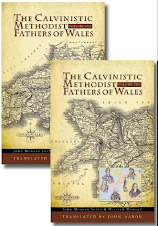In her autobiography of 1857, Elizabeth Davis, the Balaclava nurse, says this at the end of Chapter 3:
All through my childhood and early youth, I cherished a very high opinion of my own goodness, and I was more especially proud of my honesty and truth. While I lived at Bala, no one could persuade me to receive the Lord's Supper; but during my first year's residence at Sir George's, I heard the famous John Elias preach a sermon in the Welsh chapel at Liverpool, which wrought a great change in my principles. The text was from Lam. iii. v. 27. In English, the words are, "It is good for a man that he bear the yoke in his youth." That sermon convinced me of my sin, and showed me my Saviour.
I still distinctly remember many of the remarks which John Elias made in it. The one that struck me most, as more especially applicable to my case, was his comparison of unholy people enjoying the pleasures of this world, to oxen that were fattening and rejoicing in their pasture, not knowing that they were preparing for the slaughter. After that I became a communicant, and learned to attend sermons so intently, that I could repeat long passages.
The family were good, religious people, and belonged to the Church of England. The house-steward used to read prayers for the servants, every morning and evening.
A Sunday or two after having heard John Elias, I was very much impressed by a sermon on the subject of the "Sword of the Lord," preached at our Welsh chapel by David Rhys, of Llanfynydd; especially that part of it which described people young and old doing the ways of the world, and practising all sorts of iniquity; never thinking that all the while the Sword of the Lord was hanging over them. This often recurred to my mind, and checked me in my freaks and frolics.






No comments:
Post a Comment